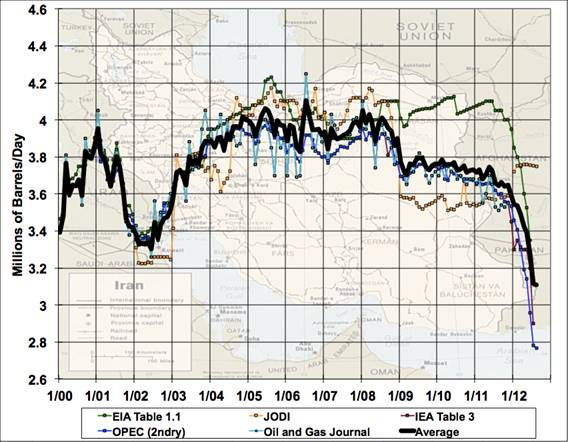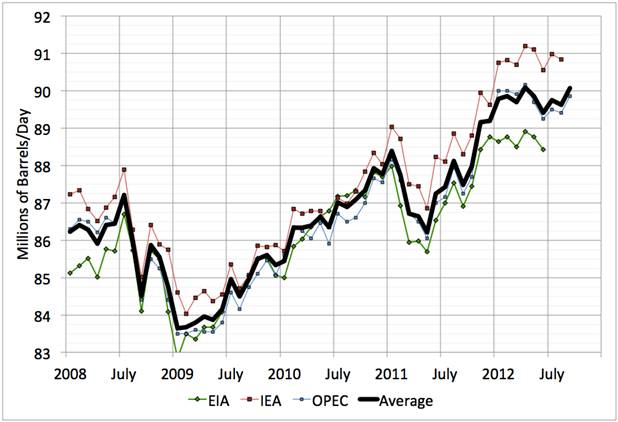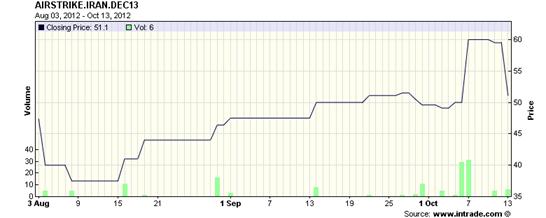The boycott of Iran has been more successful than I had anticipated, with Iranian oil production and exports down significantly from a year ago.
 |
And even stronger additional sanctions may soon be agreed upon. The measures appear to be having a significant effect on the Iranian economy, with the IMF reporting an inflation rate of 20-25% and some observers claiming the true figure could be as high as 70%. There are some signs of growing political opposition to the regime.
The goal of the sanctions is to try to pressure Iran to abandon its nuclear enrichment program. There was at least one indicator last week of some progress toward that goal, as statements from Foreign Ministry spokesman Ramin Mehmanparast seemed to signal a modest move forward in negotiations.
Of course, lower oil production from Iran has not been without cost for the oil-consuming countries. The combined effects of the loss in Iranian production and modest gains elsewhere have left total world oil production essentially flat since the start of the year.
 |
And where will this all end? Based on prices of Intrade contracts, bettors see a 12% chance of a U.S. and/or Israeli air strike against Iran before December 31, a 39% chance before June 30, and a 51% chance before December 31 of 2013.
 |
Those same Intrade markets, by the way, put a 40% probability on Mitt Romney winning the presidential election.
Sanctions may “work” in the sense that they may reduce Iran’s foreign exchange earnings. But, they will not impact Iran’s policy of exporting terror or of building nuclear weapons, nor will they dent the regime’s longevity.
Iran is ruled by a group of revolutionary religious fanatics through the thuggery and terrorism of the “Revolutionary Guard”. The rulers and the RG will continue to thrive even if the rest of the populace starves.
No better example of the truth of this theory can be adduced than the continued rule of the Kim family over North Korea. Even though North Koreans live on the ragged edge of starvation and often starve, the reign of their masters is threatened only by their own demented bellicosity.
Similarly, the only threats to the Iranian regime are 1) the United States could wake up out of its socialist torpor and bomb them until the rubble bounces, or 2) ethnic revolt by the non-Persian population, which includes Balochs, Turks, Arabs, and Kurds, all of whom hate the regime and all of whom are supported by non-Iranian ethnoi in neighboring countries.
I still can’t understand why we did not do this to Israel, Pakistan and India.
Of course you would not recognize this success if you listened to the Republicans in the debate.
I have also read reports of 70% per month inflation in Iran. If these reports are correct (or even in the right ballpark), the inflation will hurt them even more than the sanctions.
JDH wrote:
The measures appear to be having a significant effect on the Iranian economy, with the IMF reporting an inflation rate of 20-25% and some observers claiming the true figure could be as high as 70%.
Professor,
What does Iranian inflation have to do with the sanctions? Are you saying that there are fewer goods in Iran because of the sanctions? If so shouldn’t you show their decrease in imports?
I am not saying that there might not be a relationship; I don’t see it from your data. This just seems to be an assumed statement. You normally back-up your comments.
My gut feel is that Iranian inflation is due to their mishandling of their currency supply.
I think Rich is right–high inflation will hurt. And Spencer is right, too: The administration deserves some real credit for this. Like Jim, I was more pessimistic in what I thought the sanctions would achieve.
But Walter may also be right. There is no guarantee that sanctions will cause the Iranian regime to abandon its nuclear program. But it might bring them to the table.
And Dilbert, Iran’s differentiated treatment must surely stem for Ahmadinejad’s repeated calls to obliterate Israel. Were Iran to claim that it reserved the right to have nukes because India, Pakistan and Israel did, well, that’s one thing. But I never see the guy but that he calls for Israel’s destruction.
I think we tend to think that Ahmadinejad is just making populist noise, but that may not be the case. Anyone stupid enough to build a nuclear bomb while threatening a nuclear state may be unpredictable. Look at it from the Israeli perspective: If Iran gets the bomb and seems to pose a credible threat to use it, well, my response is not a hard call if I’m an Israeli leader.
This was the key lesson of the Cuban missile crisis: Nuclear powers never, ever threaten each other with nuclear weapons. It’s just too risky–but Ahmadinejad doesn’t appear to know that.
@Walter Sobchak. What is your point? Sanctions have severely weakened their economy, their political power at home, and their ability to export terrorism. What more do you want?
Would you and your ilk be satisfied if we escalated into another war in the Middle East? Do you believe in your own words enough to sacrifice your comfortable existance to volunteer and put yourself in harm’s way? Do you believe more American lives need to be destroyed prosecuting your wars so that your idealogical purity can be preserved and you can sleep better at night?
From Upstream Online
US Oil Workers Wages Soar
Oil and gas workers in the US saw their pay increase at a faster rate than any other sector thanks to booming production in the country, according to a new report.
Wages in the oil, gas and mining industries rose by 4.9% in the past year, according to Payscale, which analyses data from more than 10 million US workers.
The next closest sector was utilities, where wages rose by 4.4%.
These gains have helped push overall US wages up by 3% in the past year – the largest gain since Payscale started tracking compensation in 2007.
“There is still no stopping the pay increases for jobs related to energy or technology, particularly highly skilled ones,” Payscale said in the report released this week.
“When an employer is very profitable, there is more room for pay increases. Energy-related companies have done well over the last few years.”
A sharp rise in oil and gas production, made possible by advances in drilling and completion technologies, has fuelled job growth throughout the US. North Dakota, which has become the second biggest oil-producing state outside of Texas, has the nation’s lowest unemployment rate.
Payscale said it is “not surprising” that workers in these industries are seeing pay hikes, given the high prices of oil and other commodities.
The trend is also reflected in the regions where oil and gas jobs are concentrated. The Houston metropolitan area saw the highest annual growth in compensation at 3.9% and the Dalla-Fort Worth area in northern Texas saw the third highest rate of wage increase at 3.5%
Ricardo: Oil exports are the major source of government revenue for Iran. With fixed government spending commitments and inadequate revenue to pay for them, the government, like others in the situation, tries to make the payments anyway by printing the money.
Thank you Professor. That makes sense and comports with my thoughts on their mismanagement of their currency.
The Iranians have to trade-off the economic cost of persisting with their nuclear ambitions and the increasing value of having a nuclear arsenal. US policy has always at war with itself. On the one hand we tighten the economic costs for Iran, and then on the other hand we go around teaching bad regimes that the way to avoid forcible regime change ala Saddam Hussein style is to have a deterrent nuclear force. Saber rattling makes a nuclear arsenal more valuable. And then we wonder why the Iranians and the North Koreans are willing to suffer economic hardship.
Israel just called for new elections not to mention the upcoming US election, so the odds of an Israeli strike before the end of the year are slim to none. And if Obama wins re-election it wouldn’t be a sure thing that the US would allow an Israeli strike. Any Israeli strike would have to enter air space controlled by the US, and Israel has no guarantee that US forces wouldn’t bring down Israeli jets. In fact, the US might not have a choice but to shoot down Israeli jets because if Israeli jets did get into Iranian airspace the Iranians would (probably quite rightly) assume US concurrence. That would be very hard to contain.
soviet union??? that map is a bit old!!!
Ricardo and JDH, it’s not just the money printing that’s causing the reported inflation. Sanctions have cut Iran off from the international financial system, meaning there is a shortage of dollars. Of what little dollars there are, the majority are earned by the gov from the black stuff, which controls them tightly. The even smaller amount that is (now illegally) available on the private currency markets is chased by so many rials, that the price goes up. Currency devaluation passes through to inflation as Iran imports a large amount of goods. Should note that reports of hyperinflation are IMO overdone, as I believe that they (eg steve hanke at cato) are based on the price of currency in private markets, and overlook the fact that the gov provides dollars for basic imports at a much lower rate.